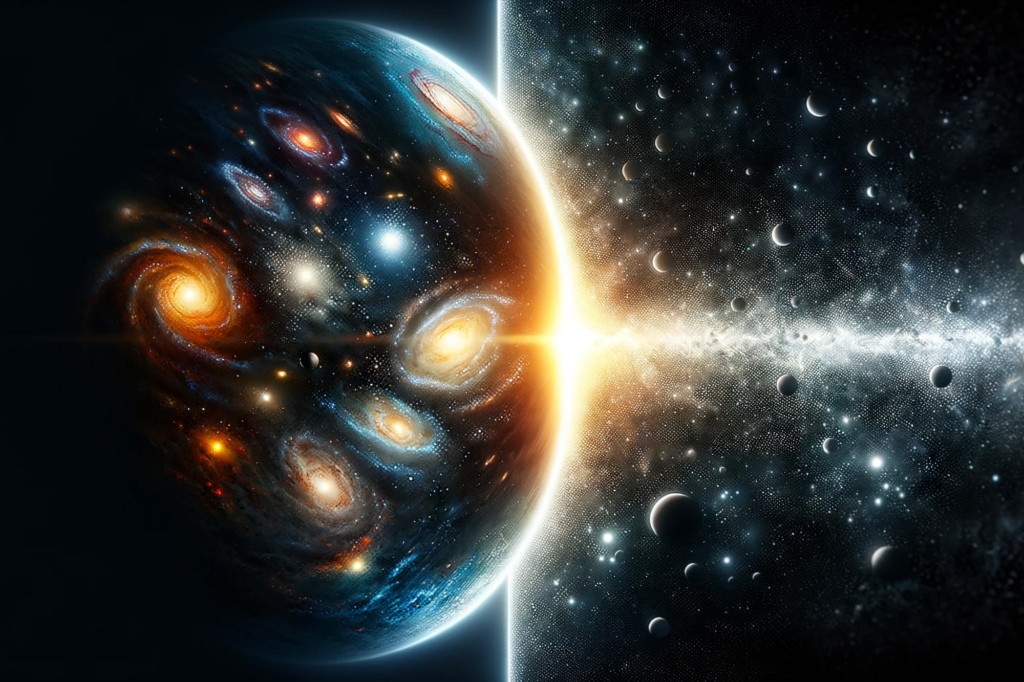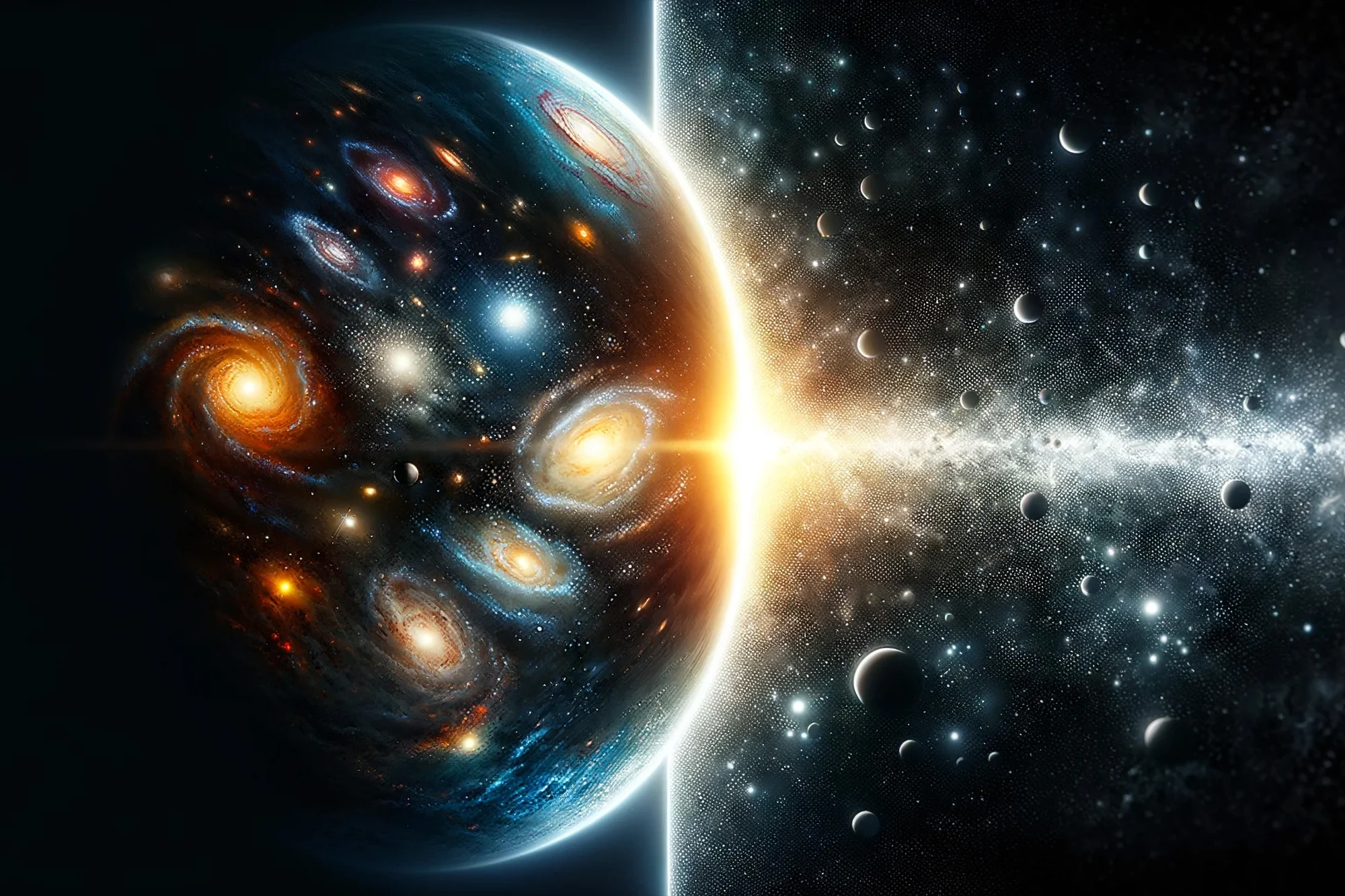Continues after advertising
As we embark on a journey through the vast expanses of the cosmos, we are often captivated by the idea of what lies beyond the observable universe. This enigmatic frontier has intrigued astronomers and thinkers for centuries, pushing the boundaries of human curiosity and knowledge. As your guide, I am Gabriel Souza, a devoted history teacher with a passion for the wonders of space and a dedication to making complex concepts accessible to learners of all ages. Together, we will explore the mysteries that stretch beyond the cosmic horizon, guided by the insights of some of the greatest minds in astronomy. 🌌
In the heart of our discussion lies a profound question: what exists beyond the universe we can see? This question challenges our understanding of reality, inviting us to consider the limitations of our observational tools and the potential of the unknown. Legendary figures like Edwin Hubble, who discovered the universe’s expansion, and Stephen Hawking, who explored the nature of black holes, have laid the groundwork for our modern understanding. Yet, even with their monumental contributions, the mystery remains unsolved, igniting our curiosity to delve deeper.
Continues after advertising
Join me as we continue to unravel the secrets of the universe, questioning and exploring the possibilities that lie beyond the observable. This journey is not just about expanding our scientific knowledge; it’s about embracing the unknown and recognizing the profound impact of these discoveries on our understanding of life and the cosmos. As we delve deeper into this cosmic mystery, remember that your curiosity is a vital part of this exploration, igniting the flame of discovery for generations to come. 🌠
What Exists Beyond the Observable Universe?
When we gaze up at the night sky, we see a tapestry of stars, galaxies, and other celestial wonders. Yet, what we observe is only a tiny fraction of the universe, limited by the speed of light and the age of the universe itself. This raises a fascinating question: what exists beyond the observable universe?
Continues after advertising
The Limits of the Observable Universe 🌌
Our observable universe is bound by the furthest distance light has traveled since the Big Bang, approximately 13.8 billion years ago. This forms a cosmic horizon, beyond which we cannot see, not because there is nothing there, but simply because the light hasn’t had enough time to reach us. Imagine standing on a vast beach with an endless ocean stretching before you. You can only see as far as the horizon, but you know there’s more beyond it.
Theories About the Beyond
Infinite Universe
One compelling idea is that the universe is infinite and extends far beyond what we can observe. If this is true, then the universe doesn’t just end at our cosmic horizon; it continues indefinitely. This raises intriguing possibilities, such as the existence of regions that are vastly different from our own in terms of physical laws and constants.
Multiverse Theory
Another captivating theory is the concept of the multiverse. According to this theory, our universe might be just one of an infinite number of universes that exist. These other universes could have different physical laws, dimensions, and even entirely different forms of life. This theory suggests that what lies beyond our observable universe is a plethora of other universes, each with its own unique reality.

The Role of Dark Energy and Dark Matter
Dark energy and dark matter are mysterious components that make up a significant portion of our universe. Although they cannot be observed directly, their effects can be seen in the way galaxies move and the universe expands. Understanding these forces might give us insight into what lies beyond the observable universe, as they could influence regions far beyond what we can currently see.
Implications for Our Understanding of Reality
The idea of a universe that stretches beyond our observation challenges our understanding of reality. If there are indeed other universes or infinite expanses, this could have profound implications for philosophy, science, and our place in the cosmos. It prompts us to consider questions like:
- Are the laws of physics the same everywhere?
- Could there be life beyond our universe?
- How does our universe fit into the larger cosmic puzzle?
Frequently Asked Questions
How do we know there’s more beyond the observable universe?
While we can’t see beyond our cosmic horizon, the laws of physics and the uniformity of the universe suggest that it likely continues beyond what we can observe. The isotropy of the cosmic microwave background radiation also hints at a universe that is similar beyond our observational limits.
Could we ever observe the unobservable?
Technologically, we are limited by the speed of light, which means we cannot directly observe beyond the current limits. However, advancements in theoretical physics and cosmology might provide indirect evidence or new ways of thinking about what’s out there.
Why is understanding what’s beyond the observable universe important?
Exploring these ideas challenges our understanding and pushes the boundaries of science. It inspires new theories and technologies that could one day reveal more about the universe’s true nature, potentially leading to breakthroughs that affect other areas of science and technology.
Conclusion
As we reach the end of our journey exploring what might exist beyond the observable universe, it’s crucial to reflect on the profound impact that such questions have on both our understanding of the cosmos and our place within it. Throughout history, human curiosity has driven us to look beyond the known and seek answers to the mysteries that lie just out of reach. The concept of what exists beyond what we can observe challenges us to expand our minds and reconsider the limits of our knowledge and imagination.
The observable universe, as vast and wondrous as it is, represents only a fraction of the total universe. Beyond the horizon of what we can see lies the potential for infinite possibilities—parallel universes, dimensions unknown, and perhaps even forms of matter and energy that defy our current scientific understanding. The pursuit of these answers pushes the boundaries of physics, philosophy, and even our technological capabilities, as we develop new tools and theories to peer further into the cosmic abyss.
Thank you for joining me on this exploration of the cosmos. Your willingness to ponder these profound questions not only enriches your understanding but also contributes to the collective quest for knowledge. Keep looking up, keep questioning, and remember that each of us plays a vital role in unraveling the mysteries of the universe. 🌌✨

